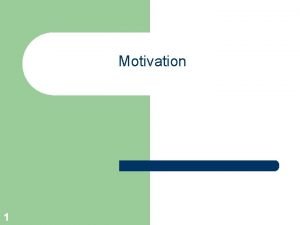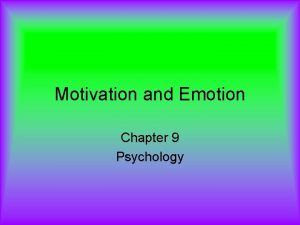The DOs of Extrinsic Motivation Suggestion DO reward


- Slides: 2

The DO’s of Extrinsic Motivation Suggestion DO reward or praise the process (not the result). DO use extrinsic rewards for unpleasant, tedious, or procedural activities, such as learning systems for selfregulation. DO use rewards/praise to induce interest or participation. DO give unexpected rewards to encourage behaviors that you want to reinforce. Reason Why. . . This practice supports growth mindset. Extrinsic rewards have been shown to increase completion of, and engagement in, these task types. Extrinsic rewards are effective in the short-term, and can spark interest/engagement in previously uninteresting topics and activities. Then, the activity may be continued due to intrinsic motivation. When a reward is unexpected, it has been shown NOT to have the negative effects on intrinsic motivation that expected rewards have. For example. . . Offer praise for changing strategy, persisting, or using appropriate help-seeking. Your kid has a project due in two weeks. You encourage them to break it up into small chunks. For each completed 30 minutes of work, your kid rewards themselves with 15 minutes of gaming time. Your kid is feeling disinterested in extracurricular activities and has been resistant to try something new. You offer to buy ice cream on the way home from a new activity to sweeten the deal. You’ve struggled to get your kid to keep their room clean. One day you discover them cleaning without prompting. Later, you surprise them with an outing to do their favorite activity. preparedparents. org

The DON’Ts of Extrinsic Motivation Suggestion Do NOT offer extrinsic rewards for behaviors that must continue in the longterm. Do NOT offer extrinsic rewards for results or outcomes. Do NOT offer extrinsic rewards for already intrinsically rewarding behavior. Do NOT use extrinsic rewards for creativity or problem-solving. Reason Why. . . As the motivation effects wane, you have to “raise the stakes” for the behavior to continue. Also, rewards can be habit-forming; when the reward system is removed, motivation decreases. This promotes fixed mindset and discourages growth mindset by valuing product instead of process. For example. . . Parent uses a homework sticker chart, where kids get a sticker each time they complete their homework. Instead, try talking to your kids about their homework, helping them make connections between what they’re learning and their other interests. You offer to buy ice cream if your kid’s soccer team wins their game. Instead, recognize effort and improvement, and honor the process, win or lose. As a reward for reading, you offer treats or screen time for every book your kid reads. This has been shown to reduce intrinsic motivation (overjustification effect). Extrinsic rewards have been shown to decrease performance at these types of tasks. Instead, create time and space to read together and allow your kid to talk about what they are reading and share what they think about it. You offer to pay your artistic child to paint a picture for Grandma. Instead, highlight a particularly lovely work by your child and offer to frame it for Grandma. preparedparents. org



